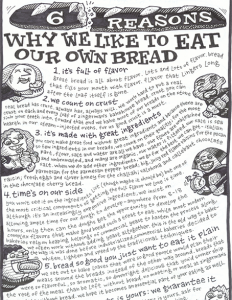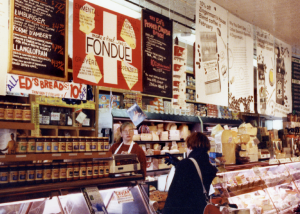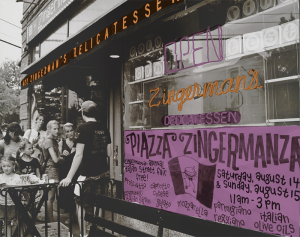Magazine

Eat Your Words
Writer James Tobin goes deep into the newly arrived Zingerman’s collection to understand the story of one of Ann Arbor’s most iconic businesses—as in the literal story. Co-founder Ari Weinzweig’s on-paper voice helped a fledgling eatery define a new way to go to market and, eventually, build an empire of businesses that walked the talk.
by James Tobin
Greenberg’s Delicatessen was getting ready to open in an old brick storefront in Ann Arbor in March 1982. Between stocking shelves and hiring staff (all two of them), the young owners bought a green neon sign and hung it in the window.
We wanted a name that would convey the sense of a good local deli, something that would “sound Jewish,” would somehow telegraph that this was a real delicatessen.
The words in italics are Ari Weinzweig’s. He and his partner, Paul Saginaw, are Jewish, but they thought neither of their own names would work, since “Weinzweig is unpronounceable,” as Ari says, and Saginaw, an anglicized version of “Sagin Or,” Hebrew for “seer of light,” wouldn’t work in Michigan, where “nobody hears Saginaw and thinks ‘corned beef sandwich.’”
So they picked the name of a little old lady Paul knew.
And then about ten days before we were due to open, the phone rang.
I answered politely, “Good afternoon. Greenberg’s. May I help you?”
A pushy-sounding guy on the other end demanded, “Let me talk to Mr. Greenberg.”
“There is no Mr. Greenberg,” I answered honestly.
Not put off in the least, he went on: “Well, where’d ya get the name, then?”
“Do you like it?” I asked innocently.
“Yeah, I like it,” he shot back. “It’s mine, and you can’t use it.”
Mr. Greenberg had just registered the name “Greenberg’s Delicatessen” in Lansing.
He was planning to open in the Detroit suburbs; we were adamant about staying in Ann Arbor. But he was convinced that he was on his way to national fame and franchising.
So the partners made up a new name that would be easy to find in the Yellow Pages.
It sounded Jewish. And, as everyone now says with a chuckle, it has “zing.”
The joke was on Mr. Greenberg, since of course it was Zingerman’s, not Greenberg’s, that rose to national fame, and not through franchising. In fact, just the opposite.
The Myth
Ari Weinzweig remembered the anecdote about Mr. Greenberg, wrote it down, and eventually published it more than 20 years later in his first book, Zingerman’s Guide to Good Eating (Rux Martin/Houghton Mifflin Harcourt, 2003).
When I browsed through the 18 boxes of the Zingerman’s collection at the Bentley, it dawned on me that some unquantifiable part of the business’s amazing success is, indeed, a story, written in hundreds of thousands of words by Ari Weinzweig himself.
Because it turns out that he is not only a guru of good food and an eccentric entrepreneurial genius, but also a first-class writer of prodigious energy and output.

Words upon words! This bread packaging tells customers about how Zingerman’s bread is made, the ingredients used, and how it should taste.
The Bentley collection documents the company’s growth as a dollars-and-cents enterprise, from the little corner-store deli of 1982 to a constellation of food-related businesses with hundreds of employees and millions of dollars in revenue.
But in box after box of papers, what stands out is Ari’s voice as a writer. It’s in the prose of old newsletters on newsprint, mission statements, training manuals and records from the writing of his seven books and a pile of pamphlets and hand-made chapbooks.
In these writings, he has spun what anthropologists might call a myth—not as in a fable, but as in a meaning-rich symbol and ideal.
Here’s my try at defining the Zingerman’s myth: It says that in a country swamped with corporate retail chains selling semi-good-to-mediocre stuff under fake-sincere claims about “quality,” “natural” products, and how much they care about “the communities we serve,” there can still be a strong, profitable business that employs hundreds of people (with benefits); that really is local; that really does sell quality goods; that does more than pay lip service to helping its town. And the myth has been written and vouched for by one of the guys who started the place— an aging hippie in a black T-shirt who may be a millionaire, but who made the money without lying or screwing people.
Am I right? Don’t a lot of Ann Arborites and Michigan alumni believe that story, even if they mutter about paying $19.50 for a good Reuben? (See “Why Our Sandwich Costs What It Does” on the Zingerman’s Delicatessen website, also written in the Weinzweigian voice, which begins: “One of the unwritten rules of the restaurant business is: Never do anything to bring attention to prices. Unless, of course, they’re really low . . . .”) Isn’t Zingerman’s the first place (after the University) that Ann Arborites mention when they try to explain to outsiders what the city is like?
The Man
Ari is from Chicago. (From here on out, I’m going to drop his last name. Even the newest counter help at Zingerman’s calls him Ari.) He grew up with no interest in food. As a student at the University of Michigan (he graduated in ’78; Paul in ’76), he got deeply interested in 19th-century anarchism—not the bomb-throwers but the philosophers who argued for a humane reordering of industrial society.
In the anarchist vision, the individual was to be prized. Communities would come together by mutual consent and thrive on the instinct of mutual aid. The enemies of the individual’s autonomy and well-being—states, class hierarchies, private property, and religion—would go away.
But ideology was less important than a person’s actual behavior, according to Emma Goldman, the Russian-emigre anarchist who appealed most to Ari. She wrote: “I don’t care if a man’s theory for tomorrow is correct. I care if his spirit of today is correct.”
He read the German anarchist Gustav Landauer, who, Ari says, “looked for ways to build up positive community and support the individuals within it. His solution wasn’t to fight the state, but to ignore it, and to create caring, free communities in its place.”
These ideas lodged in Ari’s mind.
He took a job washing dishes at Maude’s restaurant, where he and Saginaw, now the general manager of Zingerman’s, became friends. It’s here he became interested in food. As he worked his way up to line cook, he and Saginaw talked about starting a food business. Thus: Greenberg’s/Zingerman’s Deli.
A delicious selection of smoked and cured meats, sausages, cheeses, smoked fish, prepared foods, baked goods, fresh dairy products & dry goods from around the world. (From the cover of the original 1982 menu.)
The Method
Ari wasn’t happy with the business’s early newsletter copy, so he took over and started writing it himself. In 1991, he and Saginaw added the Zingerman’s Coffee Company next door, then the Bake House, Mail Order, and a catering arm. They also started Food Gatherers, a not-for-profit that went to restaurants and grocery stores for food that would have been thrown out and took it to meal programs for people in need. (This wasn’t just a few food baskets. By 2018, Food Gatherers would be distributing enough for five million meals all over Wash– tenaw County.)
“I never took writing classes,” he says. “I mean, I didn’t intend to write.” He just wrote—newsletter copy, sandwich-menu copy, catalog copy, whatever. “I would agonize over every word and rip up paper and get mad,” he says.

The story around Zingerman’s food has been as important as the food itself. Word-packed
signs, labels, and print pieces detail not just ingredients, but the company’s mission and values.
Then he joined a writing group and read books on writing. He relaxed into what English teachers call “freewriting”: just scribbling the flow of his thinking, then revising.
He’d been studying food in books and on world travels. He wrote about it in a conversational voice inflected by his low-key sense of humor and his . . . what? Call it hippie-capitalist egalitarianism. Weird combination, but it was working, both in the writing and in the business.
Who’d have thought you could sell so much sheep’s milk cheese in a small town in the middle of Michigan?
The business changed the town and vice versa.
You can’t really cut too many corners with your corned beef and pastrami when every tenth customer used to live in Manhattan.
Yet he couldn’t devote concentrated time blocks to writing. “I mean, I had a job,” he says. He got in the habit of pulling out a laptop whenever a few minutes opened up.
Eating better food is part of pursuing a better life . . . We do not market our food to some so-called “gourmet elite.” . . . Toward this end we will give a taste of any product we sell to a guest who would like to try it. We just want people to have the chance to try food they’ve never had . . . We are confident that the more people get to try it, the more of it they will buy. (From the Zingerman’s Employee Handbook.)
Friends began to say: “You know, you should write a book.”
He loved to read. But he was a food guy, a businessman, not a writer.
The Manuscript
Then, he decided to try it.
He gathered his writings in a manuscript that was much more ambitious than a glorified ad for the deli. Zingerman’s Guide to Good Eating was nearly 500 pages about artisanal foods from all over the world, with chapters on olives, oils, vinegars, cheeses, grains, meat and fish, chocolate, and seasonings. Recipes were mixed with essays, advice, and travelogue.
Freshly ground pepper doesn’t just make you sneeze—it perfumes the entire room. Pick up a bit and rub it between your thumb and forefinger. You should be able to feel the essential oils as you move it back and forth.
He was advocating for high-quality food but without the snobbery. He was urging people just to pay attention. Everybody. It was the anarchism.
Although I long ago left behind my belief in political anarchism, I’ve remained something of an anarchist in my approach to food. The standard industry perception is that the most flavorful foods should be reserved for an elusive upper-crust gourmet elite. But the way I see it, good food is for everyone. . . .
I couldn’t care less whether or not food is fancy; I just want it to taste good . . . What really gets me going are simple, down-to-earth dishes. Stuff with substance, with solid roots, with history and heritage.
For example, when Zingerman’s Roadhouse, a full-service restaurant, opened in 2003, it served mac and really good cheese—with really good bacon mixed in.
The Magic
National media took notice. Paul and Ari started Zingtrain, their corporate training arm, with long-time friend and U-M alumna Maggie Bayless (M.B.A. ’84) as the managing partner.
The Zingerman’s Community of Businesses emerged, including the Creamery, Candy Maufactory, Coffee Company, Mail Order, a second restaurant (Miss Kim’s in Kerrytown), catering, and event spaces. Today, there are managing partners in all the businesses, as well as more than 200 Community Share owners, i.e. staff members who own a share in the business.
Inc. Magazine called it “the coolest small company in America.”

Customers wait outside Zingerman’s Deli in Ann Arbor in this undated photo.
But no franchising. Great idea, Mr. Greenberg, but no way. They couldn’t visualize a Zingerman’s in Southfield or Chicago. It was the anarchism again. Zingerman’s was enmeshed in the Ann Arbor ecosystem. They couldn’t pretend it would be the same somewhere else.
Ari still wrote about food. But in a quarter-century he’d learned a lot about running and growing a business, too. He began an even more ambitious writing project.
He had soured on big-time New York publishing. He wanted to do books his own way. So he launched Zingerman’s Press, which in 2010 published another big, ambitious book: A Lapsed Anarchist’s Approach to Building a Great Business.
Three more books made a mega-series of four on management, including A Lapsed Anarchist’s Guide to . . . Being a Better Leader; Managing Ourselves; and The Power of Beliefs in Business.
That includes Ari’s belief in “managing by pouring water,” which he does several evenings each week at the Roadhouse—the founder-boss-philosopher practicing what he calls both “servant leadership” and “just being in the business where the action is.”
I know I have a lot of strange stuff in this book. Mixed metaphors, magical thinking, and people you never heard of—anarchists, folk singers, hobos, obscure business writers, pig farmers. But hey, if you got this far in the book, you’re either used to it, or you’re nigh on as odd as I am . . .
In the last few years, I’ve probably learned as much carrying my water pitcher around the Roadhouse as I have sitting down to read. Word has it Emma Goldman once uttered: “When things are bad, scrub floors.”
The Zingerman’s collection is open to the public.
